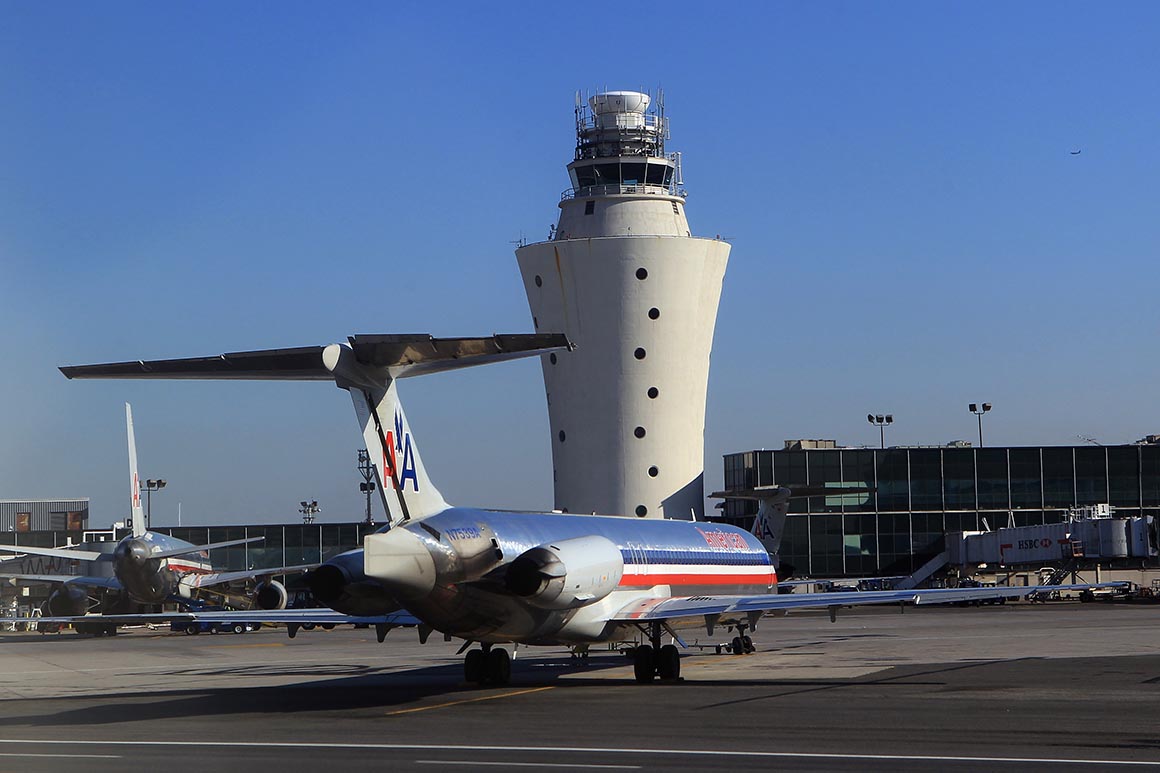
Sandy Murdock, who was chief counsel for the FAA during the Reagan administration, noted, however, that the agency was able to handle the air traffic controller strike in 1981 as well as a fire at a major center near Chicago in 2014.
„It’s going to take a pretty good whack“ to majorly disrupt traffic, Murdock said. But „if all of those little red circles on the map get larger and larger and larger, it’s going to be very hard. … I think we’ll get to a point where you may see a 10 percent nationwide reduction or point-to-point reduction. And after you go through that for a while, then you may see a system failure.“
However, the drop in demand for air travel will „reduce the pressure to have the same level of operations,“ Murdock added. „So there may be supply and demand offsetting each other equally for basically the same reason – sick people in the control towers and people not getting into the airplanes.“
One air traffic controller who works at a large facility in the D.C. area said the system will start to show strain if a major center has to be closed for several weeks, or if two centers in the same region are shut down at the same time. Such disruptions would be mitigated by fewer planes being in the sky, but the controller said as of Friday he hadn’t yet seen air traffic decline by much, even though airline bookings have fallen dramatically.
“Our air traffic system is resilient and flexible,” the FAA said in a statement, noting that all facilities have contingency plans to “keep air traffic moving safely when events impede normal operations. In some cases, this means transferring duties to adjacent facilities.”
“Each disruption has a distinct impact on the air traffic system,” the agency added. “We are experiencing this at the handful of facilities already affected by COVID-19. This is frustrating and inconvenient, but is necessary in the interest of safety.”
Mike Perrone, the president of the Professional Aviation Safety Specialists, a union that represents FAA technical employees, said he thought the FAA was slow at first in reacting to the outbreak.
“They were slow to get to the dance, I mean as was, I think, the government in general,” Perrone said in an interview with POLITICO on Friday. “They were trying to just … follow regulations. The administrator’s waiting for the DOT secretary. The DOT secretary’s waiting for OMB and the president’s guidelines.”
“Now, they are moving, they are trying — but just, again, a little bit too late,” he added. “Hopefully we can get ahead of it across the board, not just the FAA.”
Perrone said he’s urged the agency to ensure managers across the country are consistent in encouraging telework and social distancing. He said PASS’ members, who maintain equipment at air traffic control facilities, need “a common message, a common philosophy.”
“Right now, it’s piecemeal,” he said. “At one location, the manager says, ‘Go home. You can’t come to work.’ [At] another location, ‘No, you have to come to work.’”
The FAA is considering deferring some maintenance work, similarly to what’s done during holiday seasons, Perrone said. PASS has also recommended workers stop reporting to a central location to cut down their interactions with other employees.
Overall, Perrone said the FAA needs to be more “flexible” and “think outside the box” during the crisis, which is unlike any other faced by the aviation industry.
“We’ve got to be able to do things in a different way to keep people safe and keep the system — if they want to continue it — up and running,” he said.
Last week, PASS complained that some technical workers weren’t immediately told about a potential coronavirus case at Las Vegas’ McCarran tower.
The controller in the D.C. area said that his facility was slow to send home trainees and encourage those who could telework to do so as much as possible, but that changed as last week went on. “They’re trying to send as many nonessential folks home as possible,” the controller said on Friday.
Last week, Rep. Jennifer Wexton (D-Va.) sent a letter to FAA Administrator Steve Dickson detailing concerns about telework not being mandated for nonessential employees and a lack of cleaning products.
The FAA said in a statement it „is encouraging all eligible employees to telework to the maximum extent possible,“ and for employees who can’t perform their work remotely, the agency is „employing social distancing measures and increasing the cleaning of workspaces to reduce risk of exposure.“
The agency also said facilities generally have enough cleaning products, „with the exception of isolated cases.“ And in those instances, „managers are authorized to buy them locally,“ the FAA said.
„We are not requiring employees to bring supplies from home, although some employees are doing so voluntarily,“ it said.
Source: politico.com
See more here: news365.stream






